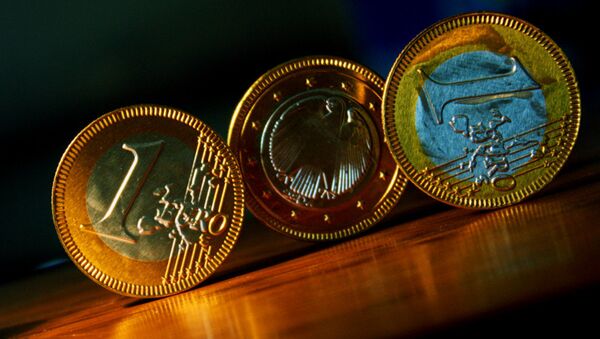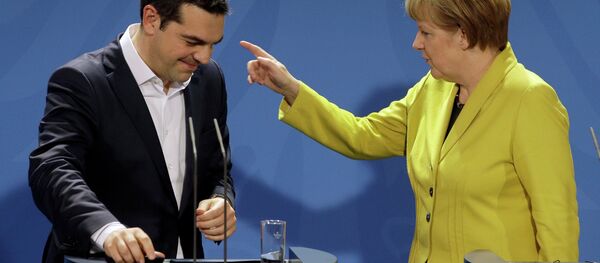Despite some economic data suggesting the Eurozone is well on the way to recovery, leading British economist Roger Bootle is far less optimistic about the economic prospects of the bloc, and in particular, the future of the euro single currency.
Something 'Catastrophically Wrong' With Eurozone
Mr Bootle points out that while the Eurozone's bond markets suggest the bloc has nothing to worry about economically, there are worrying concerns in regards to the growth of various economies following the 2008 global financial crisis.
Roger Bootle, as usual, tells it how it is: The eurozone’s economic crisis is far from over | via @Telegraph http://t.co/uNC8osNxEw
— Wayne Andrews Mg Dir (@TreasuryTutor) April 13, 2015
Taking data from 2008 until the third quarter of 2014, he highlights how poorly the Eurozone has performed compared to other economies around the world.
During this time the US economy grew by 8.4 percent, the UK improved by 3.4 percent, while overall world growth was 17.7 percent. However, instead of experiencing some limited growth as well, the eurozone economy retracted by 2.2 percent.
And while the individual economies of Germany of France recorded small growth, equivalent figures for Spain, Portugal, Italy and Greece were minus 6.4 percent, 7.3 percent, 9.5 percent and 26 percent respectively.
David Simonds, eurozone crisis pic.twitter.com/xsh0ezB39F
— Yannis Papadopoulos (@ipapadopoulos) March 25, 2015
The astonishing drop in productivity, particularly in Greece, is even more concerning when contrasted with the economic performance of other non-Eurozone European economies such as Norway and Switzerland, which grew by 6 percent and 8 percent over the same time period.
This data, combined with further analysis of booming Asian markets, has led many to question whether the concept of the single European economy is doomed.
"There is clearly something catastrophically wrong in the would-be state of Europe," Roger Bootle wrote in The Telegraph.
Franco-German Motor 'Shunted off the Road'
Among the reasons why the Eurozone as a whole has been struggling has been put down in part to the widespread divergence between various economies in the zone, leading to the creation of so-called dominant and periphery nations.
While Germany has consistently been one of the Eurozone's strongest performers, others such as Portugal, Spain, Italy and Greece have faced severe economic struggles.
Spain’s jobs crisis will last as long as it is in the euro, by @tomgilltweets http://t.co/CGRgKzJHSN pic.twitter.com/PSDvXtaq3W
— Left Futures (@leftfutures) March 10, 2015
However, there are increasing concerns over the state of the French economy, which for so long had performed in a similarly positive fashion to Germany's.
Roger Bootle believes that a lack of labour market reforms in France is a major reason behind the country's economic challenges, and inability to perform as well as Germany.
"As France's performance has started to diverge from its erstwhile close partner, increasingly it is coming to resemble the peripheral countries rather than the Germanic core of the monetary union," he said.
"Moreover, without deep and fundamental reforms, it is difficult to see things changing. Since such reforms would strike at the essence of the French model, and would be seen by many in France as an abandonment of the 'French way', they seem politically impossible to implement.
"In short, not only has the 'Franco-German motor' stalled but the vehicle has been shunted off the road."
Greece 'Cooking the Books'
The debate over Greece's economy and its effects on the eurozone has also been a matter of significant debate, with Greece for many years accused of 'cooking the books' and masking the state of its true debt.
As a result, the Greek economy was forced into a monumental EU bailout with significant austerity measures implemented to ensure the repayment of loans, and as some have suggested, an ongoing relationship of dominance and dependence between core and periphery countries.
However, many officials from better-performing eurozone countries have been accused of being complicit in the Greek masking of its finances.
In conversation with Joseph Stiglitz, on the Eurozone and, to a lesser extent, on Greece. https://t.co/tlYhm6pKBc
— Yanis Varoufakis (@yanisvaroufakis) April 10, 2015
Some analysts have argued that other stronger Eurozone economies were well aware of the true extent of Greece's economic problems but didn't raise the alarm, because it has been suggested that they would ultimately benefit from having weaker nations as part of the currency.
As the negotiations continue between Greece and other eurozone officials, there is a growing thought among economists that Athens may in fact leave the bloc.
"I think Greece would be better off outside the eurozone," Jennifer McKeown, Senior European economist from research company Capital Economics told Sputnik.
"For the likes of Greece, it's true that the euro has been holding back their economy. Without the euro, the Greek currency would have presumably dropped very sharply and exports could have started picking up quite some time ago."
"Also of course Greece is bound by the loans that have been made to it by other eurozone countries and it now has massive debts.
"That's not to say that the eurozone is going to break up altogether. You might see the likes of Greece leave, and I think there's quite a possibility of that happening, and perhaps even one or two others will ultimately follow, but I think a core group will remain as part of the eurozone," she added.
Finland the 'Next Greece'
An additional concern is the growing economic state of Finland, with Finnish opposition leader Juha Sipila warning the country could be the next Greece and may face an economic crash.
With close to one in five people unemployed, Finland is the latest Eurozone country facing an economic crisis, with rising labor costs, a diminishing workforce and a reduction in exports to Russia contributing to three years of recession.
There are fears these problems could trigger a crash in the Finnish economy and potentially a "lost decade" for the country, as parliamentarians try and agree on what reforms to introduce to reverse the concerning trend.
In his analysis of the problems facing the eurozone in the Telegraph, Mr Bootle believes that "the euro is at the root of the trouble," as a lack of fiscal and political union between the countries has led to a "dog's breakfast" situation, where different states with different problems and different values have been put together under one currency.
"It is really beyond parody. We can only hope that a revival of the world economy succeeds in lifting the eurozone, and that somehow, by muddling through, the current dire situation improves such that the awful dangers of another financial crisis are avoided. If this does not happen, then those politicians who shoe-horned the disparate countries of Europe into the euro will have a very heavy responsibility to bear."





